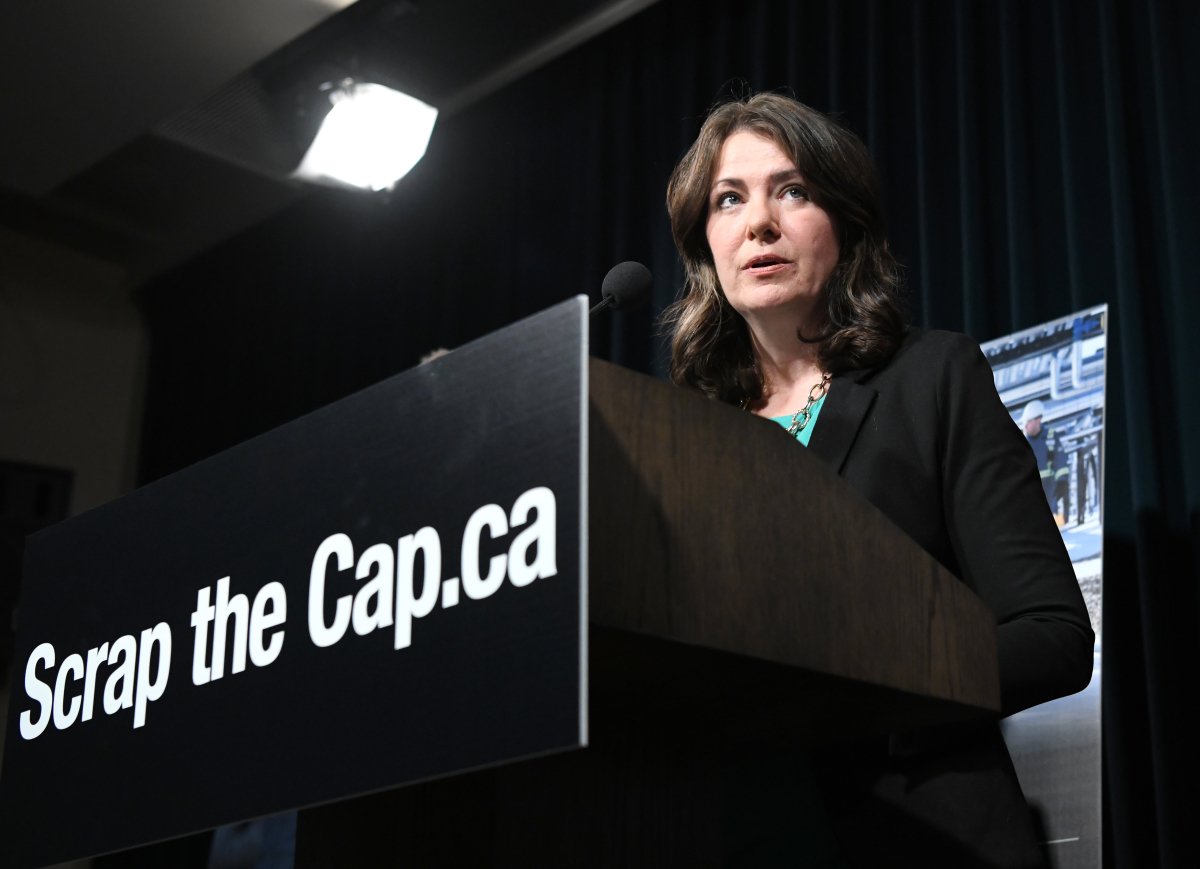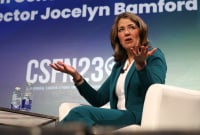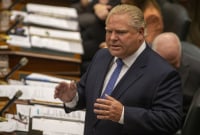Support strong Canadian climate journalism for 2025
Alberta’s $7-million ad campaign, railing against a proposed federal industrial emissions cap, comes just weeks before a leadership review for Premier Danielle Smith whose party members are hungry for conflict with Ottawa.
The cap, which will rein in rising oil and gas sector emissions, is one of the federal Liberals’ key climate policies to lower Canada’s greenhouse gas emissions which cause global heating. Political analysts say they were not surprised by the timing of Alberta’s latest salvo.
“Everything that's happening coming out of the Smith government right now is focused on the upcoming leadership review,” Lisa Young, a political science professor at the University of Calgary, told Canada’s National Observer in a phone interview on Oct. 17.
“One of the things that's very important to parts of the UCP (United Conservative Party) base is that the Alberta government is standing up to Ottawa,” Young said. “The range of opinions within the party goes from wanting to have a highly conflictual relationship with the federal government to outright separatism.”
A handful of policy resolutions up for debate at the UCP’s annual general meeting on Nov. 1 and 2, illustrate this anti-federal sentiment. One states that the province should “continue to distance itself from the federal government in as many facets as possible,” and another proposes to model a new federal agreement on the Quebec-Canada Accord to give Alberta more control over immigration. Another calls for “continued vigorous opposition to the federal carbon tax while supporting our federal Conservative Party efforts to ‘Axe the Tax’.”
Battling with the federal government is a time-honoured provincial strategy that is particularly effective in Alberta, said Lori Williams, an associate professor at Mount Royal University in Calgary. She pointed to former premier Peter Lougheed’s fierce opposition to the Trudeau government’s National Energy Program in the 1980s.
“The strategy of basically saying, ‘I'm defending you against this tyrannical or invasive federal government,’ serves to distract from some of the shortcomings of a provincial government,” Williams told Canada’s National Observer.
Since she took over as UCP leader in 2022, Smith has been in almost constant conflict with Ottawa. She has picked fights with the federal government over policies that will not apply in Alberta, like a proposed program to reduce greenhouse gas emissions from cattle feedlots.
Along with sustained opposition to the federal government’s carbon pricing system, her government launched a similar ad campaign last fall against federal regulations aimed at decarbonizing Canada’s electricity grid by 2035. That campaign inspired more than 21,000 people to write to their MP asking them to oppose the clean electricity regulations, according to an emailed statement from Alberta Environment Minister Rebecca Schulz’s press secretary Ryan Fournier.
Like last year’s campaign, the new “Scrap the Cap” campaign announced Oct. 15 will run ads in a variety of provinces. Ads will run on TV, online video, print and social media in Alberta, B.C., Ontario, New Brunswick and Nova Scotia until the end of November.
The campaign website’s claiming the oil and gas emissions cap will cripple the Canadian economy are based on industry and government-commissioned studies that use “the most extreme case that could be conceived,” according to Chris Severson-Baker, executive director of the Pembina Institute, a think-tank that has analyzed and found numerous shortcomings in the studies.
The ad campaign is one of Smith’s latest attempts to shore up support among UCP members before they vote on her leadership performance at the UCP’s annual general meeting in Red Deer next month.
“No conservative leader, whether Progressive Conservative or UCP, since Ralph Klein has finished the term,” Young said. Former Premier Jason Kenney stepped down as party leader after receiving a slim majority — 51 per cent — at his leadership review in 2022.
“The internal dynamic in the UCP is such that there is a real desire to hold the leader accountable to the grassroots on policy issues, even if it means potentially pulling them to positions that aren't saleable to the general population of the province,” she explained.
“Smith has correctly assessed herself as being at risk here, and she has spent the last two months, travelling the province, attending town halls with UCP members and responding to their concerns,” Young said.
Some of these grassroots positions are illustrated in the 35 policy resolutions up for debate at the party’s annual general meeting. This includes a proposal to stop labelling carbon dioxide as a pollutant and instead, celebrate it as a "foundational nutrient for all life on Earth” as well as abandon the government’s “aspiration” to reach net-zero greenhouse gas emissions by 2050.
Young says she believes Smith will get more than 50 per cent of the vote but it's not clear whether she will surpass 80 per cent. Alberta NDP Leader Naheed Nenshi won the NDP leadership race with 86 per cent of the vote in June.
Williams thinks there’s some risk to Smith’s decision to spend millions on ad campaigns opposing federal climate policy when Albertans are “very worried about other issues, like affordability and health care.”
“What benefit can be shown for this, this very significant expenditure of dollars, $15 million in all?” Williams asked.
When asked about the impact of the 2023 “tell the feds” campaign and the metrics used to gauge its effectiveness, Fournier said it was “a huge success,” and “helped raise awareness of how these federal regulations will increase costs and threaten grid reliability, and sparked organizations and individuals from across Canada to raise similar concerns about this dangerous approach.”
“Wouldn't this money be better spent trying to deal with these health care issues or affordability issues that Alberts are facing?” Williams asked.
Natasha Bulowski / Local Journalism Initiative / Canada’s National Observer






Comments
Just shows how the oil & gas planted premier Danielle Smith continues to cater to the O&G industry than the people of Alberta. The $7M would have been better spent on education and healthcare. Oh wait, that goes against conservative policies at all levels. Spend and cut to protect the oil & gas industry, while cutting back on education and healthcare. You can expect Pierre "Snake oil Salesman" Poilievre as PM will cut taxes as he claims, but watch and see there will be cuts in education and healthcare to make up the revenue shortfall.
A political party dominated by grassroots that believes what it says it believes in the rational to their CO2 resolution is both dangerous and a bit funny. Arguing that CO2 is essential to life on earth is true enough, but going on to claim 420 ppm is the lowest its been in 1000 years is a blatant lie, designed to give fossil fools a carte blanche to continue emitting.
We were at 350ppm a few short years ago....and before that when 350.org was established, that climate organization was trying to keep CO2 at 350 ppm. Thanks to the fossil fuel industries, it didn't succeed.
Yes...plants sequester CO2, but the burning boreal has turned our northern forests into net emitters.......fires release more CO2 than the massive boreal can now sequester.
What the UCP, and many Albertans seem not to understand is the concept of limits. CO2 is essential to life.......within ppm limits. Past those limits it becomes trapped in the atmosphere as a greenhouse gas, and contributes to global warming.
As that warming speeds up, more and more positive feedback loops like fires, will kick in and accelerate the process. Already extreme weather is destroying infrastructure and taking lives.
The UCP suffer from a classical delusion: They believe they are somehow immune from hurricanes, atmospheric rivers, flash floods and decade long droughts. They may imagine God is an Albertan.
She oversees a larger territory than that. Nor do I imagine she's much intimidated by UCP or TBA nonsense that thumbs its entitled nose at science.
As I keep saying, the living, breathing "SHE" that most thinking women are solemnly watching with bated breath right now ALSO BELIEVES that some "god" or other actually EXISTS somewhere other than in her own HEAD!
Therein lies the intractable problem with taking down the growing ANTI-SCIENCE in our midst, with all its accompanying, outright LIES. Newly emboldened (I'd go so far as to say now fully arrived), CHRISTIAN NATIONALISM via a political right wing that is not just by pure "coincidence" seen as having lost its collective mind, has finally succeeded after decades of concerted effort in tying one hand permanently behind the collective backs of the political LEFT WING, still steadfastly, obliviously HOLIER-THAN-THOU and therefore ultimately amenable. So the right wing are not the only ones laboring under mass delusion.
Witness the B.C. election: The Green Party, exquisitely attuned to societal evolution and original champions of science and so the FIRST to focus on the reality of climate change, are paradoxically led by YET ANOTHER believer in one of the ancient desert religions, EVEN NOW when "picking a lane" is in fact existential!
In perusing the riding results, I see at least a half dozen where the Greens split the progressive vote and the Cons won. But will the media or anyone mention that when we have the f**king, beloved HORSE RACE to focus on?! NO.
It may end up with the Greens having what is for them always the best case scenario (like the federal NDP), that of holding the "balance of power." Or the numbers might make the cons WINNERS of government, and we all KNOW what that means.
So tell me again how "voting your conscience" has any merit whatsoever anymore when not only SCIENCE has been sidelined, but MATH as well.
Where are all the scientists when we most need them, scientists like Suzuki who have been proudly sailing above the fray since Harper muzzled them?
In fairness, I'm referring to Elizabeth May as the original and current leader of the FEDERAL Greens, so don't know if the B.C. leader identifies as a believer or not, but on the other hand, when does ANYONE when it's considered either rude and/or irrlevant when it absolutely IS NOT.
Mary, the comments system here needs a YouTube style like button. Your comment deserves many thumbs up as it is spot on.
Jason Kenney became, first, leader of his vanity project, the new United Conservative Party; then he became Premier of Alberta (aka “Oilberduh”). He did it by prodding awake the Radical-Right Separatosaurus.
Kenney then discovered that, once roused, Separatosaurus cannot be lulled back to sleep. It roars louder with every minor victory. Every crumb fed in hopes of quieting it whets its appetite for more.
Jason Kenney was kicked out of “his” party because he wasn’t radical-right ENOUGH.
Danielle Smith knows this. That’s why she was so attentive to “her” caucus right after they elected her Queen of the UCP. That’s why she’s listening to all their complaints and conspiracy theories. That’s why she agrees (more or less; usually more) with whatever they say. Make no mistake—Danielle Smith does not have a political party. The UCP rank and file have a leader—until they decide she’s betraying them.
Smith has to walk three different tightropes at once. She has to satisfy:
• The oil company owners, especially the small fry who bitch loudest about “carbon tax” and environment regulations
• The UCP Faithful, whom she’s assiduously sucking up to prior to the leadership review
• And last, enough other voters to ensure she doesn’t lose control of what passes for a government in Oilberduh right now.
Sooner or later, Smith will either fall or be knocked off one of those tightropes. She’ll do a lot of damage to our province before she falls.